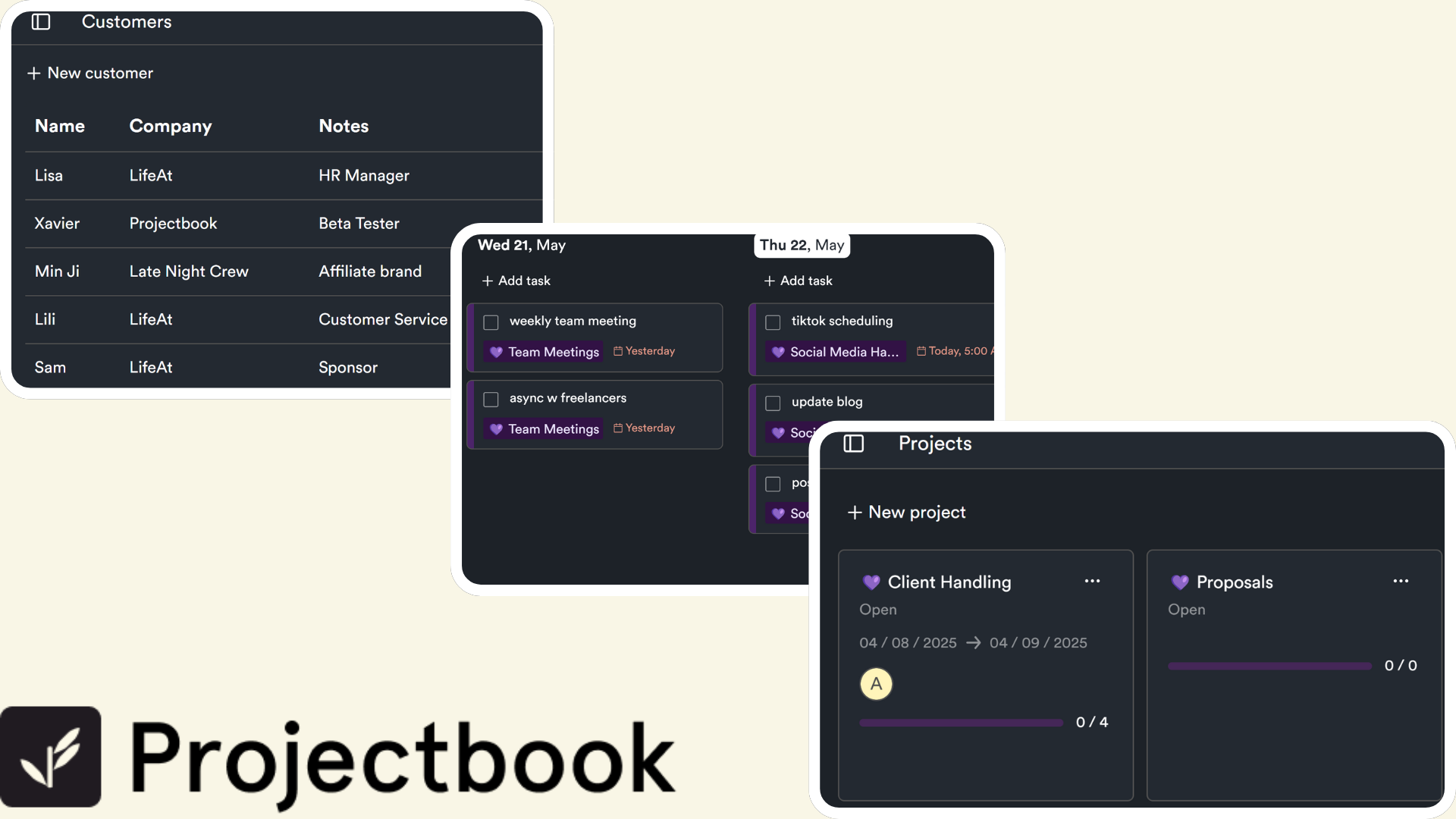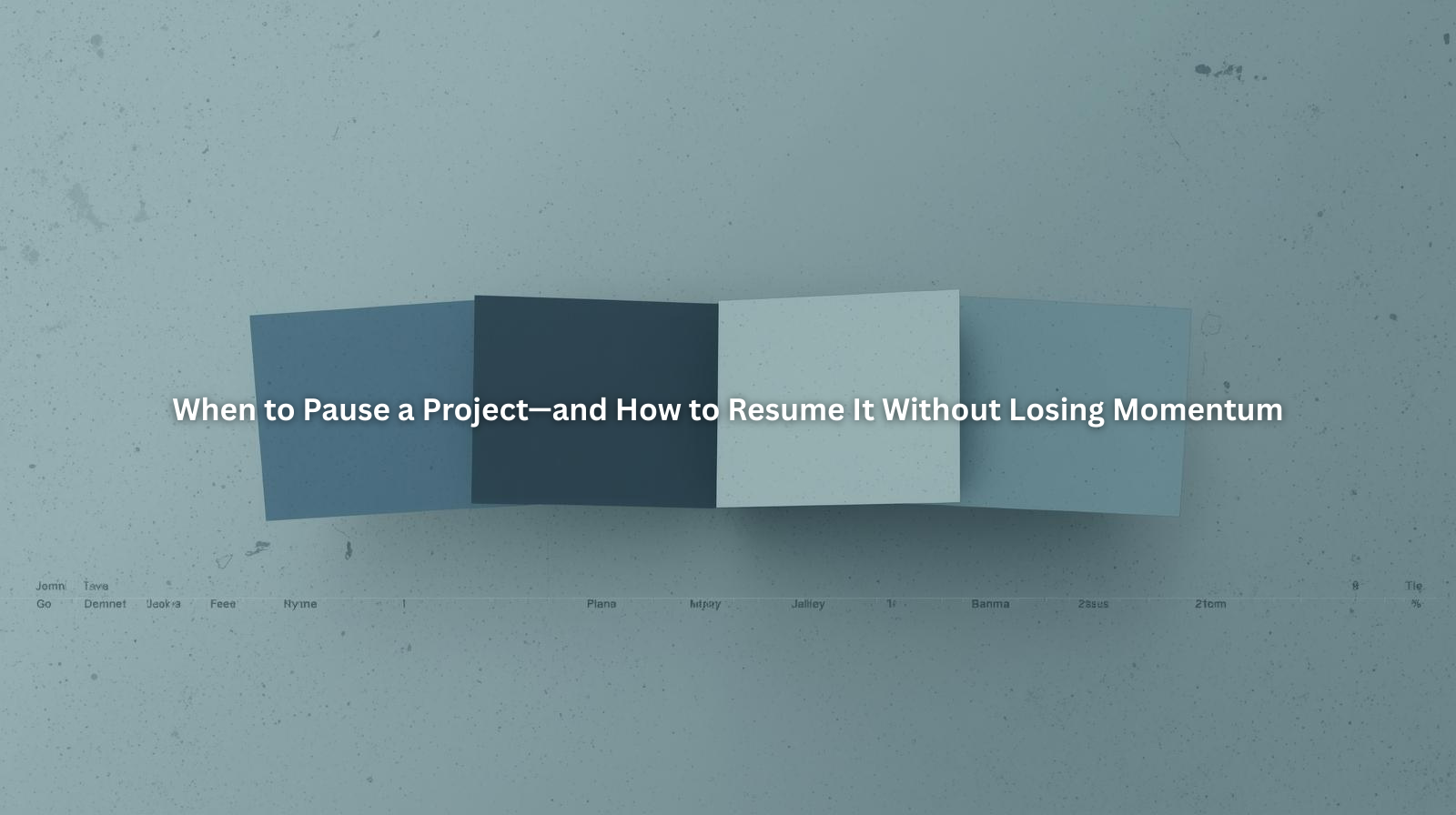How to Prep Your Projects Before Vacation (So You Can Actually Log Off)
.png)
Table of Contents
- The Freelancer Dilemma: Time Off ≠ Time Away
- Why Prep Work Matters More Than You Think
- Set the Dates—and Stick to Them
- Rework Your Project Timelines with Breathing Room
- Communicate Early (and Gently) with Clients
- Create a “While I’m Away” System That Has Your Back
- How ProjectBook.co Helps You Log Off Without Letting Go
- FAQ: Freelance Vacation Planning
1. The Freelancer Dilemma: Time Off ≠ Time Away
If you’re self-employed, you know this dance: you say you’re going on vacation… but your brain (and inbox) stay open. Maybe you bring your laptop “just in case.” Or you check Slack while sitting on the beach. Or you leave projects half-wrapped, telling yourself you’ll “just finish it from the cabin.”
Taking time off as a freelancer is hard. Not because you can’t, but because you *haven’t built a system* that lets you unplug confidently. That’s where project prep becomes the difference between a real break—and a working getaway.
2. Why Prep Work Matters More Than You Think
Most freelance stress doesn’t come from the work—it comes from what’s unfinished. Loose ends. Unclear expectations. That one client you forgot to follow up with before you left. These are the things that haunt your vacation brain at 2 a.m.
Prepping your projects in advance gives you a clean handoff to future-you. It helps clients feel calm and informed. And it gives you permission to actually rest—knowing your projects are paused, communicated, and will be right where you left them when you return.
Even a few hours of prep can buy you days of peace.
3. Set the Dates—and Stick to Them
The first step is the simplest, but often the hardest: decide when you’re leaving, when you’re returning, and what that means for your availability. Are you fully offline? Checking emails once? Taking no meetings? Get specific with yourself before you communicate anything to clients.
Then, hold the line. If you treat your time off like a suggestion, clients will too. Respecting your own boundaries sets the tone for how others will respect them, too.
Think of it this way: a clear, non-negotiable break doesn’t signal flakiness—it signals professionalism.
4. Rework Your Project Timelines with Breathing Room
Once your dates are set, review every active project. Which ones need to wrap before you leave? Which can pause mid-way? Which need feedback or sign-off before you can proceed?
Now’s the time to buffer. Don’t cram everything into the two days before you go. Instead, look at your deadlines and shift them earlier—or extend them past your return. Be realistic about what you can actually complete (and what’s better handled when you’re back with fresh eyes).
Clients don’t mind adjusted timelines—especially when you’re upfront and ahead of schedule. What they do mind is silence, surprises, or scrambling.
5. Communicate Early (and Gently) with Clients
You don’t need to over-explain or apologize for taking time off. A simple, professional message 2–3 weeks in advance does the trick:
“Just a heads up—I’ll be offline from [start date] to [return date]. I’d love to wrap up our current phase before then if possible, or pause it cleanly until I’m back. Let me know what you’ll need from me before I go, and I’ll make sure everything’s in place!”
This gives clients time to prep, ask questions, or get you feedback before your break. It also shows leadership. You’re not disappearing—you’re setting expectations.
6. Create a “While I’m Away” System That Has Your Back
Before you sign off, tie up the small things that could create friction while you’re gone. Set an auto-responder that includes:
- Your return date
- A contact option (if needed)
- A link to shared files or a project dashboard
- A note that you’ll respond when you return
Inside your own system, mark any tasks or projects as “paused,” “waiting on client,” or “hold until [return date]” so you’re not rebuilding context when you come back. If you're mid-project, leave a short note for future-you: where you left off, what comes next, and anything still pending.
It doesn’t need to be complicated. It just needs to feel complete.
7. How ProjectBook.co Helps You Log Off Without Letting Go
ProjectBook was designed with moments like this in mind. Before vacation, you can tag tasks and projects as “paused” or “waiting on feedback,” so nothing clogs your active to-do list. You can leave notes to your future self inside each project card, outlining next steps and client updates.
If you use a shared dashboard, clients can check progress, access files, and see upcoming milestones without needing to message you directly. Everything is where it should be—visible, organized, and calm.
And when you come back? You don’t have to dig through inbox chaos. You open your workspace, see what’s waiting, and pick up right where you left off.
8. FAQ: Freelance Vacation Planning
What if a client pushes back on my vacation plans?
Stand firm but flexible. Offer to adjust timelines or wrap up early, but avoid working during your time off. Your boundaries teach others how to treat your time.
Should I tell new leads I’m away?
Yes, but with a plan. You might say: “I’ll be on break from [date] to [date], but happy to book a call once I return.” This keeps momentum without sacrificing rest.
Do I need to pause all projects?
Not necessarily. Some clients are fine with a short pause. Just be clear about expectations, and note what will resume (and when) after your break.
How does ProjectBook help with vacation prep?
You can label projects by status, leave yourself notes, and share client dashboards that keep everyone informed—so things don’t unravel while you’re gone.

Final Word
Taking time off shouldn’t feel like a risk.
With a little prep and clear communication, you can create the space to fully unplug—knowing your projects are aligned, your clients are informed, and your future self is supported.
With ProjectBook.co, vacation prep becomes part of your system, not a scramble. One place for your timelines, tasks, files, and notes—so you can go offline without your business falling apart.
Because rest is part of the work. And you deserve it.


